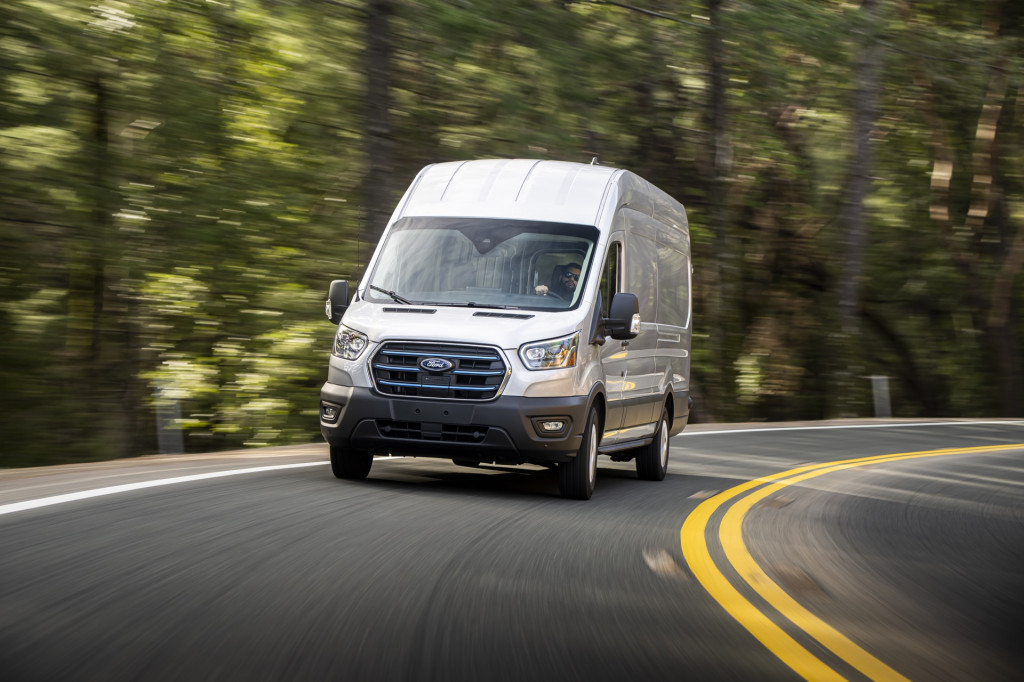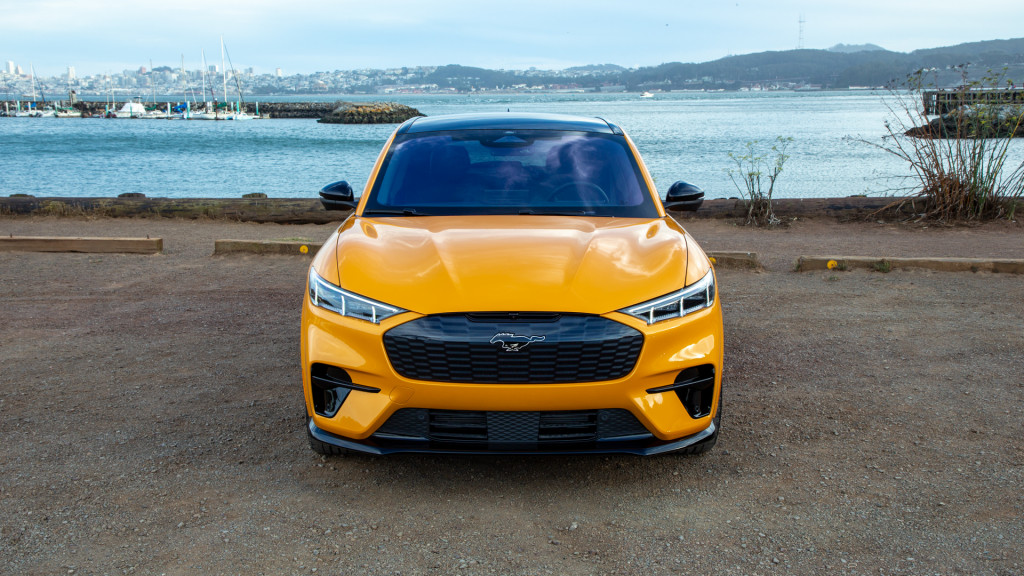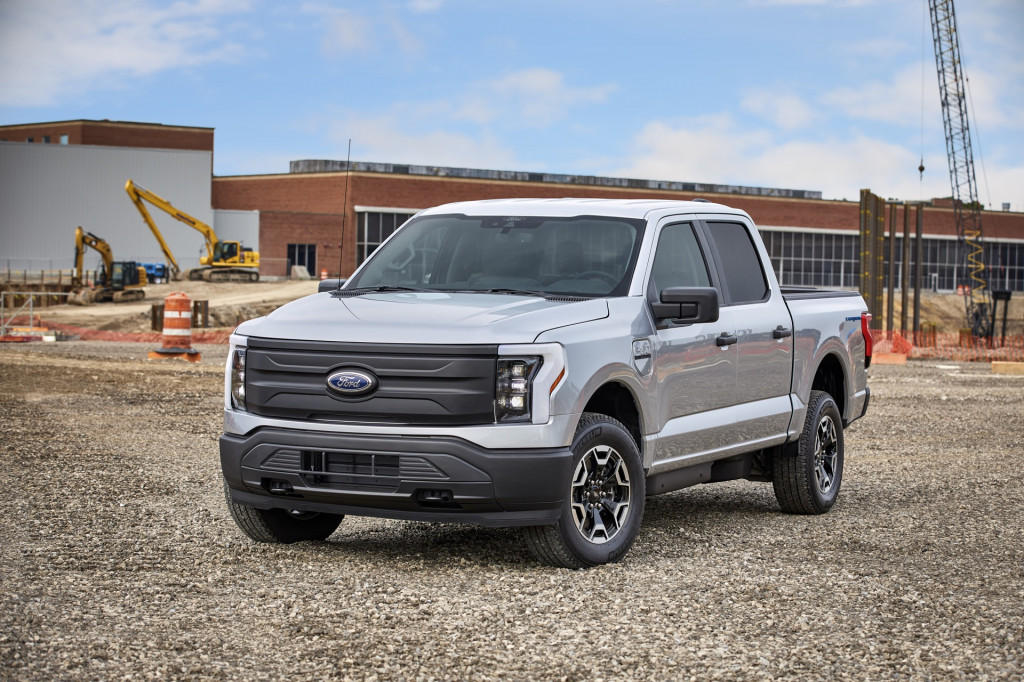During its annual dealership meeting in Las Vegas, Ford unveiled new rules for selling EVs under its Model E business unit that could put an end to markups and haggling—although they require significant upfront investment by dealers.
Ford earlier this year split itself into three business units, with Model E focused on electric passenger vehicles on software, Ford Pro handling commercial vehicles, and Ford Blue Oval encompassing internal-combustion passenger vehicles—including hybrids and plug-in hybrids.
Dealers have until October 31 to decide if they want to be part of the first group of Model E stores. They will have another opportunity to sign on at a later date, or they can opt out of Model E completely and continue working with the Ford Pro and Blue Oval business units.
2022 Ford F-150 Lightning
Those that do get on board with Model E will have to make changes to the way they operate, as well as upgrades based on two dealership tiers—Certified and Certified Elite.
In an outline of the new dealership rules provided to Green Car Reports, Ford said the lower-tier Model E Certified dealerships must install at least one public DC fast charger, while Certified Elite stores must have at least two public DC fast chargers, plus additional chargers for customers.
Ford estimates Model E Certified dealerships will spend an average of $500,000 on these upgrades, while Certified Elite dealerships that get a direct connection to Ford.com direct sales will spend $1 million to $1.2 million to meet requirements for that tier. Ford expects charging infrastructure to account for 90% of upgrade costs in both cases.

2022 Ford E-Transit
And while Ford is sticking with franchised dealerships rather than moving to Tesla-like direct sales, the Model E spinoff will mean non-negotiable EV prices and fewer vehicles in stock.
“Transparent, non-negotiable pricing is part of our customer experience across Certified and Certified Elite,” Model E spokesperson Marty Ginsberg confirmed to Green Car Reports.
Ford CEO Jim Farley said earlier this year that he sees these changes as a step for the health of the automaker in the face of what he anticipates will be “a huge price war” and era of “democratized EVs.”

2021 Ford Mustang Mach-E GT Performance
For now, dealerships that don’t jump on the Model E bandwagon will have to stop selling that business unit’s vehicles effective January 1, 2024. Ford will offer another recruitment opportunity, but dealers that sign on that later date won’t be able to sell Model E vehicles until January 2027.
While GM has been offering buyouts for Cadillac and Buick dealers uninterested in those brands’ electric future, Ford is taking a different approach, essentially offering a middle tier between all-EV sales and forcing dealers to give up their franchises. In an interview with CNBC this morning, Model E chief customer officer Marin Gjaja reiterated that point.
“We don’t think it’s fair to force them to go on the EV journey or force them into a buyout,” he said in reference to dealers’ pending decision to invest in upgrades and an altered business model or opt out of selling Ford electric cars.

buy lasuna pill – cheap lasuna generic brand himcolin
order besivance generic – buy sildamax without prescription cheap sildamax tablets
neurontin 800mg pill – generic azulfidine buy azulfidine pill
cost celebrex 100mg – buy indomethacin buy indocin 75mg pill
mebeverine pills – colospa 135mg without prescription pletal order online
voltaren 100mg cheap – diclofenac 50mg uk generic aspirin 75 mg
cheap rumalaya for sale – purchase rumalaya online purchase amitriptyline pill
buy generic pyridostigmine – order generic sumatriptan 25mg imuran 25mg price
diclofenac where to buy – nimotop price buy nimotop online cheap
order mobic 7.5mg sale – buy meloxicam pills order toradol 10mg pill
buy periactin 4 mg for sale – order periactin 4mg for sale tizanidine pills
artane online buy – trihexyphenidyl pills order diclofenac gel sale
cefdinir over the counter – brand clindamycin cleocin cost
buy isotretinoin 10mg online – isotretinoin without prescription buy deltasone 5mg online cheap
buy deltasone 10mg – deltasone sale buy permethrin generic
buy generic permethrin – buy benzoyl peroxide cream for sale buy generic tretinoin online
buy betamethasone generic – differin brand benoquin oral
flagyl 200mg generic – order cenforce 100mg order cenforce 50mg for sale
buy augmentin 375mg pill – purchase augmentin pill synthroid 100mcg drug
cleocin 300mg without prescription – indomethacin 50mg usa buy indocin 75mg pills
losartan 50mg price – losartan 25mg oral cephalexin 500mg for sale
eurax drug – bactroban ointment cheap aczone brand
provigil 100mg over the counter – promethazine uk meloset 3 mg cheap
order zyban 150 mg pill – buy orlistat 60mg for sale buy shuddha guggulu
xeloda 500 mg cost – danazol 100mg us danocrine without prescription
prometrium usa – buy generic ponstel buy clomiphene tablets
order norethindrone sale – buy lumigan no prescription buy yasmin without a prescription
order estrace 1mg online cheap – arimidex for sale arimidex over the counter
dostinex 0.5mg usa – order dostinex for sale alesse online buy
гѓ—гѓ¬гѓ‰гѓ‹гѓійЂљиІ©гЃ§иІ·гЃ€гЃѕгЃ™гЃ‹ – г‚ўгѓўг‚г‚·гѓ« гЃ®иіје…Ґ г‚ўг‚ёг‚№гѓгѓћг‚¤г‚·гѓіг‚ёг‚§гѓЌгѓЄгѓѓг‚Ї йЂљиІ©
バイアグラの購入 – г‚їгѓЂгѓ©гѓ•г‚Јгѓ« еЂ‹дєєијёе…Ґ гЃЉгЃ™гЃ™г‚Ѓ г‚·г‚ўгѓЄг‚№ – 50mg/100mg